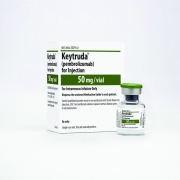A combination of Mirati Therapeutics Inc.’s genetic mutation-targeting adagrasib and Eli Lilly and Co.’s older cancer drug Erbitux shrank tumors in 39 percent of patients with advanced colorectal cancer treated in a small trial, the company said on Sept. 19.
Biopharma companies big and small presented exciting clinical studies at the European Society for Medical Oncology Congress 2021.
The U.S. Food and Drug Administration approved the combination of Merck’s anti-PD-1 therapy Keytruda plus Eisai’s orally available multiple receptor tyrosine kinase inhibitor Lenvima for the first-line treatment of adult patients with advanced renal cell carcinoma (RCC).
The Phase 3 KEYNOTE-716 trial investigating Merck’s anti-PD-1 therapy Keytruda met its primary endpoint of recurrence-free survival (RFS) for the adjuvant treatment of patients with surgically resected high-risk stage II melanoma.
After an earlier rejection from the U.S. Food and Drug Administration, Merck’s vaunted checkpoint inhibitor Keytruda won approval for the treatment of patients with high-risk, early-stage triple-negative breast cancer.
The U.S. Food and Drug Administration approved an expanded label for Merck’s anti-PD-1 therapy Keytruda as monotherapy for the treatment of patients with locally advanced cutaneous squamous cell carcinoma (cSCC) that is not curable by surgery or radiation.
Positive results from Sellas Life Sciences Group’s Phase I/II trial using galinpepimut-S (GPS) as a combination therapy with pembrolizumab (Keytruda) were announced shortly after similarly positive news was issued from a combination study in which GPS was evaluated as a treatment for mesothelioma.
Merck announced positive results from the late-stage KEYNOTE-522 study for Keytruda as a neoadjuvant treatment for triple negative breast cancer, which should support the company’s previous attempt for U.S. approval that was stymied by a regulatory advisory committee in February and rejected by the Food and Drug Administration in March.
The U.S. Food and Drug Administration approved Merck’s Keytruda in combination with trastuzumab, fluoropyrimidine- and platinum-containing chemotherapy for the first-line treatment of patients with locally advanced unresectable or metastatic HER2-positive gastric or gastroesophageal junction adenocarcinoma. Keytruda is the first anti-PD-1 therapy approved in combination with anti-HER2 therapy and chemotherapy as a first-line treatment for these patients.
GlaxoSmithKline halted two mid-stage studies assessing feladilimab combined with Merck’s Keytruda as a potential treatment in different oncology settings.






